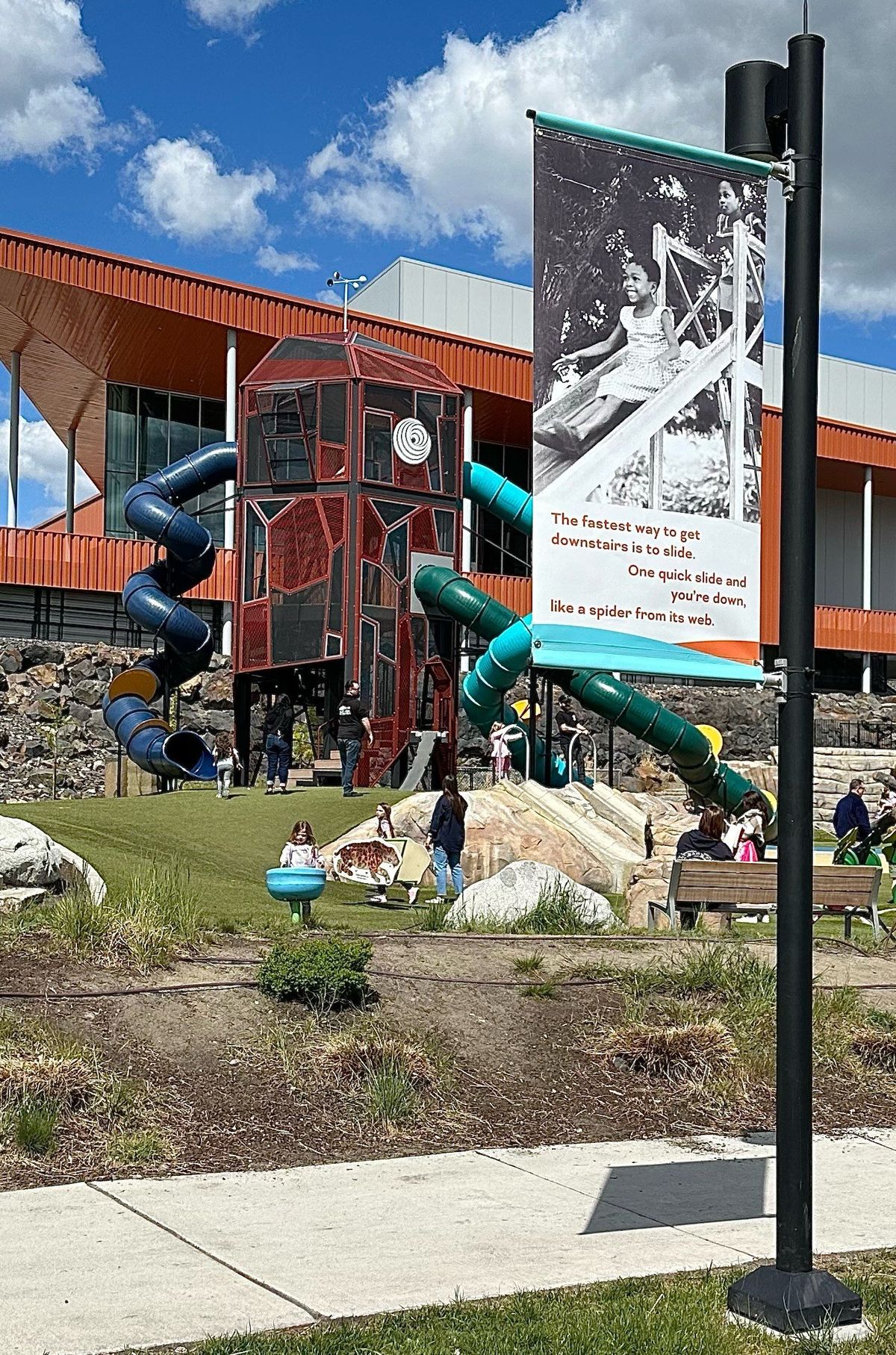‘Playtime: Then and Now’ aims to connect children and cultures

It all started in Accra, Ghana, and now one woman’s advocacy for children has traversed decades and continents to become a part of Spokane’s 50th anniversary celebration of Expo ’74. In an effort to illustrate the universality of play throughout culture and time, the Friends of Mmofra have brought “Playtime: Then and Now” to life in Riverfront Park.
The exhibit will be on display through May 30 and mirrors a message inspired by the late Efua Sutherland. A writer and educator, Sutherland authored the groundbreaking 1960 book, “Playtime in Africa,” which features poetic verses and photos of children engaged in carefree outdoor play with sand, water and nature in multiple Ghana locations.
“Mmofra” means “children” in Ghana’s Akan language and Sutherland was a champion for kids.
“It was a time when many African countries were becoming independent and people expected those countries to be focused on very basic things, so to have a book about the importance of play in a child’s development, and therefore the importance of play even on a national scale, was quite a radical thing to have happen,” said Sutherland’s daughter, Amowi Phillips, who appears in a photograph within the pages of her mother’s book. Phillips serves as president for the Friends of Mmofra, a small Spokane nonprofit group that works to facilitate the educational and cultural enlightenment of children.
Funded by a Spokane Arts SAGA grant, the “Playtime: Then and Now” display consists of 10 double-sided photo and poem montages and two contextual exhibition panels which line the walkway of the Ice Age Floods Playground in Riverfront Park. The pictures were taken by North American photographer Willis Bell, who worked closely with Sutherland on a number of projects. His works documented life in Ghana, West Africa during the postcolonial period.
“Many of these images are recognizable to people here and I think that’s an important message to send,” Phillips said.
Since the early 2000s, the Friends of Mmofra organization has collaborated with local experts and Spokane Falls Community College to preserve the historical images captured by Bell in Ghana.
“They helped examine the negatives and let us know that they were in fact viable … We created a small catalog of the photographs from the archive,” Phillips said.
An adjunct professor at Whitworth University, she teaches an African Life and Culture class and hopes the Expo ’74 anniversary display will help young visitors become more globally conscious.
“It’s a museum-quality exhibition … the landscape of the play space is really intentionally designed, but it’s also right next to grass and the river,” said Friends of Mmofra Vice President Jennifer Gale Compau, who curated the Spokane exhibit.
A local art educator, Compau praised the physical, emotional and social benefits outdoor play provides for children.
“They’re the creator. They’re the maker … They’re playing with the sun, the light, the shadows, the landscape that they find themselves in,” she said. Once a young Expo ’74 visitor herself, Compau’s family was heavily involved with the event and her mother, Nancy, wrote a book titled, “Our City, Spokane,” which contains an entire chapter devoted to the 1974 celebration.
“In my heart, this is like one of those full-circle things,” Compau said.
Decades after writing her book, Sutherland spearheaded creation of the Mmofra Foundation in Ghana. All three of her children are involved with the organization, whose mission overlaps with that of the Spokane Friends of Mmofra group. After Sutherland’s death, Phillips and her two siblings expanded on their mother’s dreams by transforming a portion of the family plot they inherited from her into Mmofra Place, a park and multifunctional educational area for children.
“What we did on my mother’s property was to create a small model, child-friendly green space,” Phillips said. “That property itself tells a story of an evolving urban landscape, because it’s very different now from what it was at the time, but what it did for myself and my siblings was it just instilled in us a real love of nature.”
Phillips recently discovered that Expo ’74 included a Pan-African program.
“It speaks to the fact that Expo ’74, in many ways, was considered a forward-leaning world’s fair,” she said.
Compau hopes “Playtime: Then and Now” will help rekindle that cultural cross-pollination experience Expo ’74 brought to Spokane families 50 years ago.
“(Sutherland) realized that it’s really important for kids to know the history of where they are from, to see their reflection from where they are from,” Compau said. “It’s children from Accra, Ghana, from 1960. You just don’t see exhibitions showing that population or the ancestors of that population at play.”